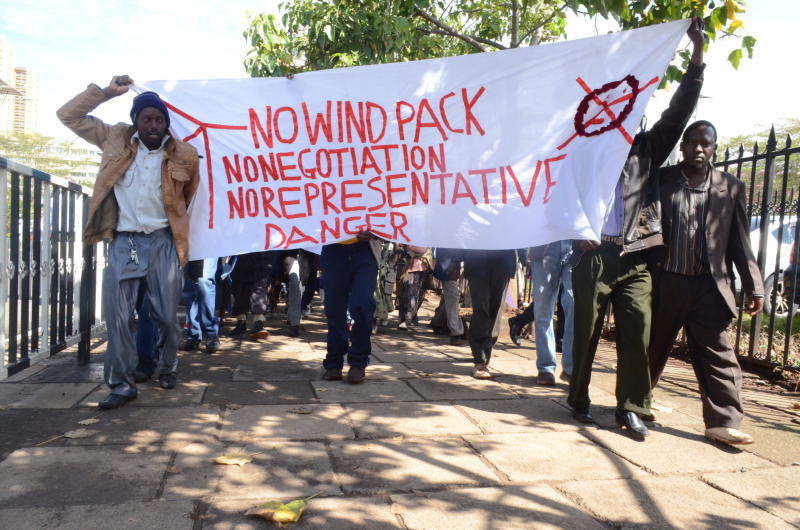 By Macharia Kamau
By Macharia Kamau
A solar park that was to be built in Laikipia County has suffered a
major setback after its key financier and project technical partner
backed out of the deal.
Norwegian State-owned investment company Norfund, together with its
partner Scatec Solar have withdrawn from the project leaving only the
proponent, Kenergy Renewables, on board.
The Rumuruti Solar Park, which will be built on a 300-acre piece of
land, is expected to cost Sh6 billion. It will produce 40 megawatts (MW)
on completion.
The plant will reduce reliance on costly thermal power plants which have partly contributed to high power bills.
If the project is successfully implemented, it will be the second solar
power plant of such scale, after the 54MW Garissa plant owned by the
State through the Rural Electrification and Renewable Energy
Corporation.
Kenergy Renewables already has a 20-year Power Purchase Agreement (PPA) with
Kenya Power.
Poor fit
Norfund said it had pulled out as the project was expected to
take longer to complete, which made it a poor fit for its investment
criteria.
“Together with our partner Scatec Solar, we assessed the development
timelines to be too long to warrant continued involvement in this
project,” said Norfund Executive Vice President for Clean Energy Mark
Davis.
The project proponents, Kenergy Renewables had late last year signed an MoU with the Laikipia County.
While a PPA with Kenya Power would guarantee the plant a market for its
power over the next two decades, there have been concerns about excess
electricity in the country.
The country had an installed capacity of 2,818MW as of December 2019, against a peak demand of 1,926MW last year.
While industry players cite the difference between installed capacity
and demand as an acceptable reserve margin for use in case power plants
are unavailable, customers have to foot for the excess of 892MW bill
that they do not consume.
This is in addition to consumers also paying capacity charges, which are
fees paid to power producers for investing in power plants.
In a year, a firm operating a power plant might not supply Kenya Power
with electricity but will be paid the capacity charges for having the
plant available to feed power to the grid.
Electricity producers have in the past defended the clause that offers
them pay even when they do not work, noting that they put up plants at
huge costs.
Such investments are usually on request by government which should have evaluated the country’s power needs.
Kenya Power has
recently said it plans to open talks with producers on reviewing the
capacity charge clauses in the PPAs, with the expectations of reducing
the amount it pays to for electricity.
Norfund however did not cite these developments as among the factors that saw it pull out of the Rumuruti project.
However, if Kenya Power succeeds, it might see Kenya’s attractiveness as an investment destination take a possible hit.
It is the second major project that has gone wrong for the Norwegian
fund, following the collapse of the Kinangop Wind Farm project, which
was cancelled in 2016 after the local community, protested.
Norfund had a 19 per cent stake in the project expected to produce 60MW on completion.
It said the two projects are not a reason to bolt out of the Kenya’s
power sector and would remain active and put money where it sees
opportunity.
“We remain supportive of the power sector in Kenya, and we are
currently, via Globeleq, in the process of building a 52MWp (megawatt
peak) solar project at Malindi,” said Davis.
Norfund owns 30 per cent of Globeleq, the company building the 52MW
solar plant in Malindi at a cost of Sh7 billion. The firm is 70 per cent
owned by UK’s CDC.
The construction of the solar plant is being undertaken by Malindi Solar Group majority owned by Globeleq.
Norfund also has a six per cent stake in the Lake Turkana Wind Power plant.
It has recently said it has diversified its investments in East Africa
and would increasingly buy shareholding and advance loans to local
manufacturing and agribusiness firms.
It has largely invested in clean energy and financial services, which form its mainstay in the region for years.
Earlier this year, it said it will also invest in waste management,
clean water and power transmission and storage as part of a new strategy
to enhance the mix of firms it owns or lends to in the country.
Norfund invested Sh9 billion in various companies across East Africa in
2019. Its investments – a mix of debt and equity – in the region stands
at $776 million (Sh78 billion) in over 520 companies.
emacharia@standardmedia.co.ke
 By Macharia Kamau
By Macharia Kamau  By Macharia Kamau
By Macharia Kamau
No comments:
Post a Comment